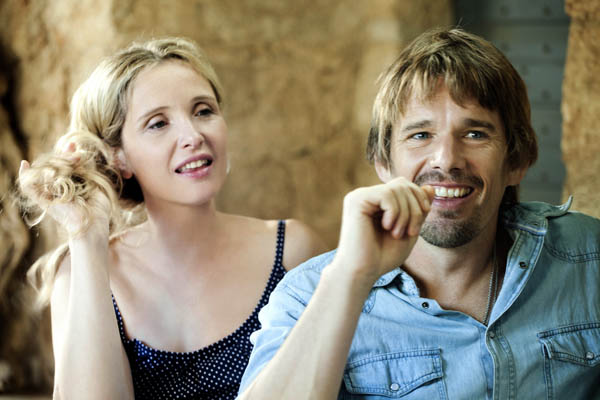![]() In Before Midnight, time has moved on once again since the last time we saw Jesse and Celine from Before Sunset nine years ago, and much more than 18 years earlier in Before Sunrise. This much is obvious—since Sunset, when they met again by chance in Paris and finally committed to their relationship as opposed to the first film, when they enjoyed a night out on Vienna—they now have twins and live in Paris. They’re vacationing with Jesse’s writer colleague, and have suffused their summer in Greece. It’s one of their last days/nights in the country, and it’s been a nice summer—according to Jesse’s son from his previous marriage, the best the 13-year-old ever had—but what now? What comes next?
In Before Midnight, time has moved on once again since the last time we saw Jesse and Celine from Before Sunset nine years ago, and much more than 18 years earlier in Before Sunrise. This much is obvious—since Sunset, when they met again by chance in Paris and finally committed to their relationship as opposed to the first film, when they enjoyed a night out on Vienna—they now have twins and live in Paris. They’re vacationing with Jesse’s writer colleague, and have suffused their summer in Greece. It’s one of their last days/nights in the country, and it’s been a nice summer—according to Jesse’s son from his previous marriage, the best the 13-year-old ever had—but what now? What comes next?
Before Midnight is a mature film, more so than the previous two, which themselves carried a high air of maturation for stories featuring young people in their 20s and then 30s. Some of this comes with early middle age. But it’s not only a movie where two characters walk around and talk about life as before. Like in the past, the dialogue’s has tangents that are extremely difficult and profound to pull off (on aging, living a meaningful life, politics, gender roles, death) without sounding too vapid or too pretentious. In other words, these two can go on about intelligent topics and know what they are talking about while being engaged with their semantics.
It’s only for a stretch of about 20 to maybe 30 minutes in the mid-section when Jesse and Celine, for the first time in the series, have meaningful conversations with other people around them. (Previously, if memory serves, their walks around the cities were punctuated with only the slightest, most tertiary interactions with others.) Jesse engages with a much older writer, an admirer a little older than him, and a younger guy; Celine with a much older woman, a slightly older woman, and then a much younger woman. Around a dinner table, this dynamic of the age range is represented, and a conversation unrolls that is like, say, My Dinner with Andre times three (though shorter) as this trio of couples and two older widowed folk talk about falling in love, what it means to be a man or woman in lust, and then coming back to getting older and the changing nature of love. Are you each your own person and find a place to meet in the middle, or are you one unit?
Linklater acts as a great guide for these philosophical musings, and it’s always engrossing, but what makes this film so much more special than the previous two is that we see what happens when conflict comes up. The antagonist is not some big entity that can be easily defeated. Jesse and Celine are given a sort of gift by their Greek friends, a night to themselves at a local hotel, and at first they like the room and try to make love. A phone call interrupts them—Jesse’s son has made it to his connection flight just fine. Yet this sparks off the argument: do they maintain life as it’s been in Paris, or go to America so Jesse can live near his son?
The obstacle here is so painful and yet so real and recognizable. When the argument flares up, there’s a theatrical nature to the proceedings, even though one may try to keep things grounded more so than the other, and Celine is probably more the instigator than Jesse. But where all this leads is just completely engrossing. The actors have taken these characters into darker contours, and Jesse and Celine know how to press one another’s buttons. This isn’t even the key to what makes all of this drama and tension work though, which on its own could make for fascinating Bergman-esque patter. It’s funny. Their arguments, more often than not, carry blistering humor.
In fact, much of this film, from a long conversation between the couple in a car driving from the airport (and in Linklater’s trademark long takes) to a stroll through a town, has a lot of sly, knowing humor. Ethan Hawke and Julie Delpy, both giving wonderful, soulful, and yet always naturalistic performances, perhaps know that the essential element to a relationship is that a spark has to be maintained, and, as I can attest, a sense of humor as well. Indeed, in a pivotal moment, Jesse says to an upset Celine, “Look, I am trying to make you LAUGH,” in one of the most genuinely romantic gestures in any film.
In a season dominated by the same blockbuster characters with their blockbuster talk and blockbuster action, Before Midnight gives us a grown-up film that has adult, funny-tragic motions, and characters that are endearing, heartfelt, and true, especially if one has seen the previous films. From the start, it approaches them as fully formed people, and could work as a stand-alone film for the uninitiated.

















Leave A Comment